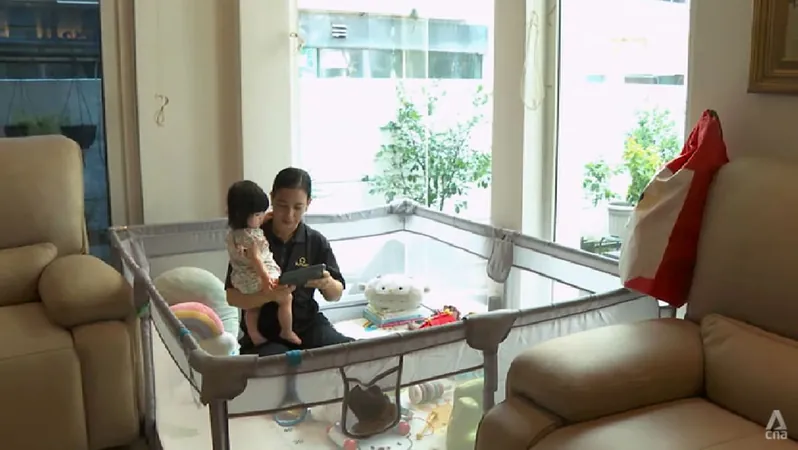
New Regulations Ensure Safety for Parents Using ECDA-Approved Nanny Services in Singapore
2025-01-17
Author: Mei
**SINGAPORE**: Parents in Singapore can now breathe a sigh of relief as a new initiative ensures that childminders offering infant care services undergo rigorous checks and training before they start working with children. To provide a secure and trustworthy environment for infants, the Early Childhood Development Agency (ECDA) mandates that these nannies pass through two rounds of background checks and receive substantial training in crucial areas such as first aid and food safety.
This pilot program, which commenced in December, specifically caters to Singaporean infants aged two months to 18 months. It aims to alleviate concerns that many parents might have about entrusting their young ones to strangers. The initiative represents a significant part of the government’s ongoing efforts to support working parents during this critical period of a child's growth.
Flexibility for Working Parents
Three key operators—Edunanny by BUTLER, Kidibliss, and NannyPro Care—have been selected by the ECDA to offer these childminding services. Parents involved in the pilot have expressed appreciation for the flexibility these services provide, though it still requires a level of trust in nannies.
According to Nicholas Lee, a parent who hired a childminder from Edunanny, the flexibility is essential, particularly given the demands of the modern workplace. "As long as it runs well, and I don’t have any issues with the company or the care that's provided to my child, I will definitely stick around," he remarked.
Parents can customize their childminding schedule based on their needs, receiving daily updates on their infant’s progress, which further fosters peace of mind while they are at work. The program aims to offer reassurance, allowing parents to remain focused and productive in their jobs.
Robust Safety and Training Standards
Safety is paramount in this initiative. Nannies engage in thorough vetting processes including two rigorous rounds of background checks—one conducted by their employers and one by the ECDA. Following this, prospective nannies must complete in-house training on basic infant care, as well as at least two external courses dedicated to infant first aid and food safety.
"This training process can take anywhere from two weeks to two months to complete," notes Becky Eng, founder of NannyPro Care. Importantly, Eng emphasizes that despite the urgency for quick placements, ensuring that nannies are completely prepared is the top priority. Her sentiment echoes a broader industry understanding that childminders must be equipped and confident in their duties before entering homes.
Parents are clearly supportive of the initiative. Over 120 families have expressed interest in the childminding services under this pilot, demonstrating a strong demand for reliable infant care options. As the program progresses, feedback from parents continues to inform and enhance the overall service quality.
In summary, the ECDA's pilot program aims to bridge the gap between the need for reliable infant care and the growing concerns of parents. Thanks to strict regulations, comprehensive training, and open communication, Singapore is taking significant strides toward providing a nurturing environment for its youngest citizens.



 Brasil (PT)
Brasil (PT)
 Canada (EN)
Canada (EN)
 Chile (ES)
Chile (ES)
 Česko (CS)
Česko (CS)
 대한민국 (KO)
대한민국 (KO)
 España (ES)
España (ES)
 France (FR)
France (FR)
 Hong Kong (EN)
Hong Kong (EN)
 Italia (IT)
Italia (IT)
 日本 (JA)
日本 (JA)
 Magyarország (HU)
Magyarország (HU)
 Norge (NO)
Norge (NO)
 Polska (PL)
Polska (PL)
 Schweiz (DE)
Schweiz (DE)
 Singapore (EN)
Singapore (EN)
 Sverige (SV)
Sverige (SV)
 Suomi (FI)
Suomi (FI)
 Türkiye (TR)
Türkiye (TR)
 الإمارات العربية المتحدة (AR)
الإمارات العربية المتحدة (AR)